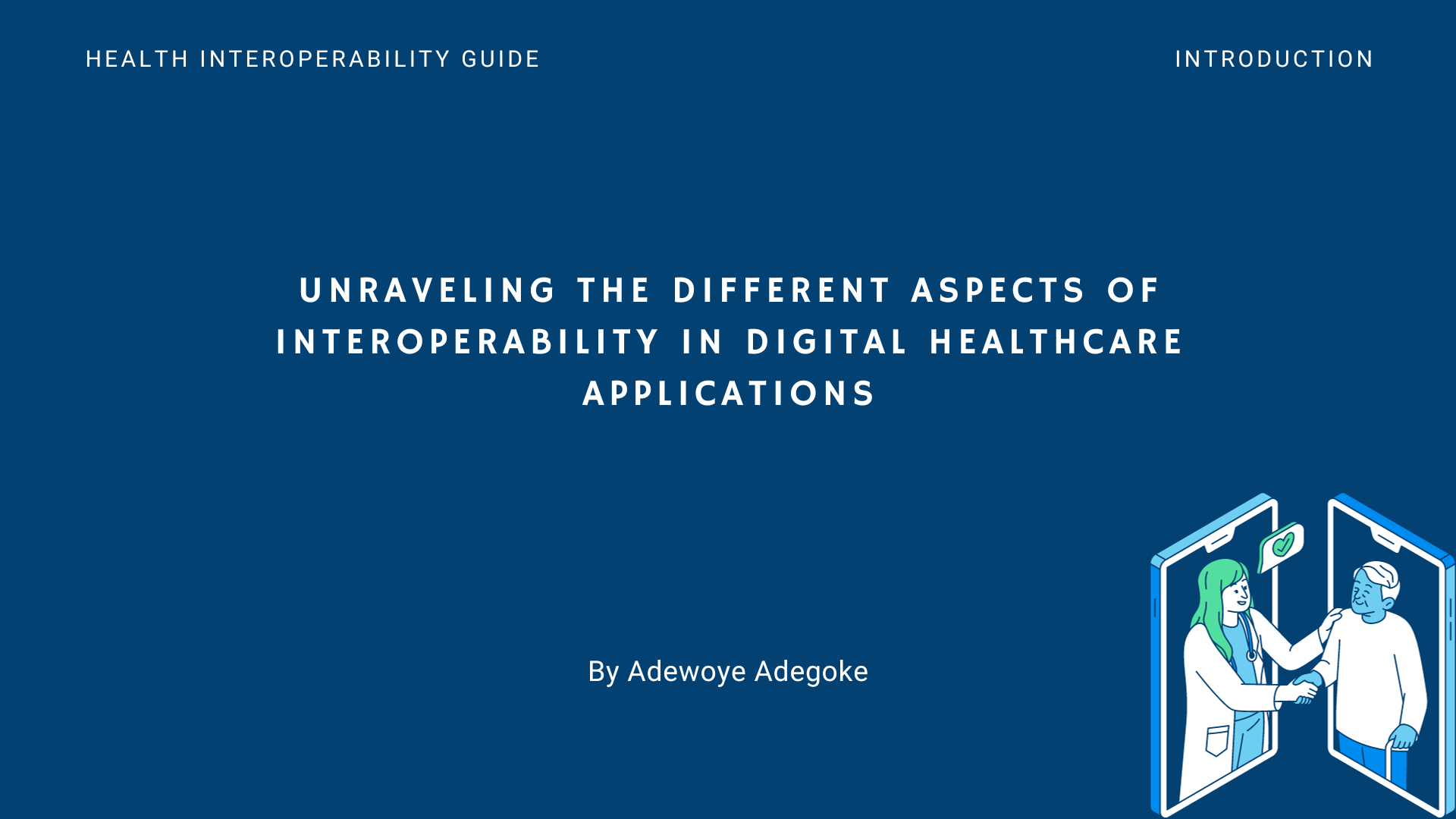What is Digital Healthcare and Why is it Important
Technology has become an indispensable part of our lives and has a deterministic effect on how we live, work, and interact with one another and by extension how we look after our health.
If you're interested in how technology affects our approach to healthcare, then you're in the right place, over the coming months, we will dive deep into the world of digital healthcare -- and trust me it's pretty exciting stuff.
What is it all about
Digital healthcare encompasses a wide range of digital devices, systems, and resources designed to improve healthcare delivery and the standards, policies, and regulations that govern the creation and use of these technologies.
Examples include telemedicine, mobile health apps, electronic health records, and wearable devices that facilitate remote consultations, real-time health monitoring, streamlined medical records management, proactive health management, and standards such as FHIR a standard for healthcare data exchange, and LOINIC an international standard for identifying health measurements, observations, and documents
Digital healthcare is a concept that has shown significant growth
Initially, it began with computerized systems for record-keeping used by healthcare institutions and healthcare providers, and over the last few decades, it has progressed to the complex integrated systems we see today which are more accessible and patient-centric.
A lot of this growth can be attributed to the rise of the internet, smartphones, wearable devices, artificial intelligence, and other technological advancements
Why is digital health important, why should we care
One of the basic tenets of technology is to improve the quality of our lives. and nothing speaks "quality of life" more than good health. therefore it is of utmost importance that we are aware of digital healthcare and its benefits on the quality of our healthcare.
Let's take a look at a few of these benefits
Improved access to healthcare
- Telemedicine (video, chat, audio) services, appointment and scheduling services, and mobile health applications have reduced the barrier to entry for healthcare consultations, preventive healthcare, and healthcare accessibility.
- This is particularly true for areas with robust infrastructure and good access to internet services. Telemedicine and emergency response systems can provide access to quality healthcare to people regardless of their location.
- Some "statistics" have shown that telemedicine services have improved access to health care in rural and underserved populations, however, this seems to be a paradox and proof is the fact that rural and underserved populations do not have access to good internet services to make use of these services.
Improved Health Engagement
- Mobile Health applications, and wearable devices, have encouraged people to take an active role in their health management.
- An example of this is health tracking apps which allow users to monitor their health and make lifestyle changes. These apps have significantly improved the interest and engagement of users with healthcare, encouraging them to develop healthy habits, make health goals, and stick to them -- or not.
Better chronic disease management
- Studies have shown a remarkable improvement in the management of chronic diseases, with digital technology.
- Applications like diabetes management applications have been shown to cause better glucose control and better health outcomes for users.
Reduced healthcare costs
- There's been talk on how digital healthcare applications can help reduce healthcare costs by minimizing unnecessary doctor visits and hospitalizations but I beg to differ. I believe these costs are not reduced but offset and moved elsewhere in the value chain. for example, telemedicine consultations can reduce unnecessary clinic visits, and save patients time and resources, but it'll cost the providers resources to be able to provide these telemedicine services
- However, I believe digital healthcare services reduce healthcare costs, through streamlined operations and administrative processes that reduce paperwork and labor costs, optimized scheduling thereby improving resource utilization, early detection of diseases, leading to timely interventions and preventing costly complications, data analytics that analyze patterns and helps to detect and prevent under/over-utilization and wastage of resources.
Improved clinical Decision-making
- Digital diagnostic services can provide valuable diagnostic insights to clinicians in making more accurate diagnoses and clinical decisions.
- There are cases of Artificial intelligence being used to detect patterns in clinical images and helping in early detection of some diseases. it's also being used to detect irregularities in the constant stream of data from wearables leading to the appropriate actions being taken on time and improving patient outcomes
Healthcare Research, Innovation, and Public Health
- Access to health data and advanced analytics tools empowers researchers to better understand health patterns, leading to improved research, healthcare innovations, and public health outcomes.
- Decision-makers can leverage these insights to make informed population health decisions, identify trends and anomalies, and improve the overall quality of population health.
There's nothing good that doesn't have its hurdles
There's a plethora of challenges faced in the development, integration, and adoption of digital healthcare.
These challenges are mostly about;
- Data privacy
- Data security
- Interoperability -- I have a section of this newsletter dedicated to interoperability in healthcare systems, you can read the previous articles, and be on the lookout for more articles on this topic.
- Integration with existing systems
- Ensuring equitable access for all patients -- Remember earlier, I mentioned populations in rural areas not having access to internet services to access digital health care? that falls under this.
And many more challenges. I'll create a different article dedicated to these challenges and the steps we can take to overcome them -- make sure you don't miss it
The future is promising
As we look to the future, existing technologies evolve and new technologies emerge.
Stakeholders in the healthcare system will continue to innovate and integrate these technologies into healthcare systems to further propel the quality of healthcare delivery thereby leading to a better overall quality of life.

